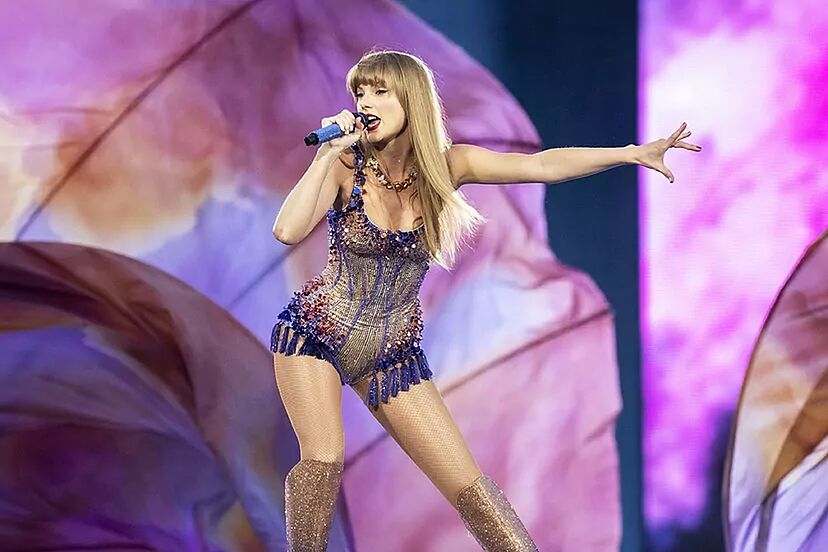Taylor Swift is arguably one of the most prolific music artists of the 21st century. Swift has 10 studio albums and 237 songs to her name. Within one day, she sold over 2 million tickets to her Eras Tour, simultaneously breaking records and Ticketmaster. Most recently, Swift made history by being the only artist to occupy all of Billboard Hot 100’s top 10 spots following the release of “Midnights.” Whether or not you like Swift’s music, there’s no denying that she’s made a huge impact on the music industry. But more than that, she’s clearly impacted people, with millions of fans devoted to her. So, what inspires Swifties (or Taylor Swift fans) to follow her?
Storytelling
Much of Swift’s appeal lies in her ability to craft stories. From tales of love triangles (“betty”) to crashing weddings (“Speak Now”) to friendships breaking up (“Bad Blood”), Swift has covered almost any scenario you might find yourself in. Relatability is a strength of Swift’s. Her songs are honest and wrought with emotion. They embrace her humanity, including her weaknesses, her faults, her joys and her accomplishments. Swift doesn’t just write songs. She writes experiences that draw inspiration from her life and create an authentic, genuine story underscored with music. Swift’s songs are personal, which makes them easy to connect to.
Relationship to Fans
Swift and her team are a master at marketing and has created multiple ways to engage her fans beyond making music and touring. Many who follow Swift will know that almost anything she does or releases publicly might hint toward a future announcement or call back upon past songs. She plants easter eggs that leave her fans with a mystery to solve. For example, her recent music video for “I Can See You” has references to her struggle to own her own music and costumes displayed from past music videos. However, the most widely talked about easter egg implied that “1989 (Taylor’s Version)” might be on the horizon.
In short, Swift has created an interactive universe around her where fans are encouraged to speculate about her next project. Not only does this generate attention to Swift herself, but also connects fans as they investigate Swift’s clues together. Swift has also opened up a gate for fans to get to know her more personally through behind-the-scenes footage of music videos or her creative process. She has also released a documentary, “Miss Americana,” where she’s honest about her difficulties with her brand and with body image. The release of media like this allows fans to get to know Swift as a singer, but also as a visionary, performer and person. She presents an image that is anything but cookie-cutter and allows fans to develop a relationship with Swift that’s personal and that resonates with their own experiences.
When Appreciation Becomes Obsession
Despite all that Swift can be praised for she is not immune from criticism and should not be treated like she is. Swift has been criticized as a performative activist, only calling out misogyny when it affects her and steering clear of more divisive and controversial issues that have the potential to damage her image. More recently, Swift has been associated with The 1975 singer Matty Healy, whose past is riddled with racist and misogynistic comments, much to the disappointment of fans. In many ways, Swift’s association with Healy seems to stand against her own words. What’s more, Swift has also been criticized for her excessive use of private jets which produced more than 8,000 tons of carbon in 2022.
Swift is far from perfect, which makes the commitment of fans who wear diapers to her shows so they don’t miss a song or spend $20,000 to see her as much as possible seem extreme. It’s also not uncommon for her fans to barrage others in her name. Fans have incessantly attacked journalists and celebrities, even to the point where Swift had to ask fans to be kind. Before performing “Dear John” on tour, she urged them not to attack John Mayer over their past relationship.
Being a fan of someone and being their vigilante is, and should be, different. Yet with so many celebrities, this line is becoming blurred. In a case like Swift’s, where she’s made her life and her struggles public, it’s easy to think she’s a friend. She’s relatable, funny and awkward, but at the end of the day she’s a public figure, and that needs to be distinguished.
Personally …
I self-identify as a Swiftie, although maybe not in as devoted a manner as some. I grew up with Taylor Swift. Her songs were catchy and her music videos were fun to watch. But as I’ve become older I’ve found myself listening to her more than I ever did as a kid. The release of “Speak Now (Taylor’s Version),” particularly resonated with me. I was never much of a fan of the original album, but it held an innocence and childlike spirit that I appreciated as a kid.
The rerelease of the album has allowed me to revisit it, but this time I’m as old as Swift was when she wrote it. She sings of heartbreak and growing up and navigating the world in a way I wasn’t able to fully understand until I reached that point in my life too. The re-recordings of her albums have not only given me nostalgia while I re-listen to the new versions of my old favorite songs, but they’ve also provided me with a sense of comfort knowing someone grown has experienced what I am now experiencing.
Swift’s discography is like a timeline of her life, and there’s comfort in knowing someone so successful and talented was once just as confused or sad or happy as me and made it into something beautiful. In a way, I’ve known Taylor Swift my whole life, but I am only now getting to understand her.



